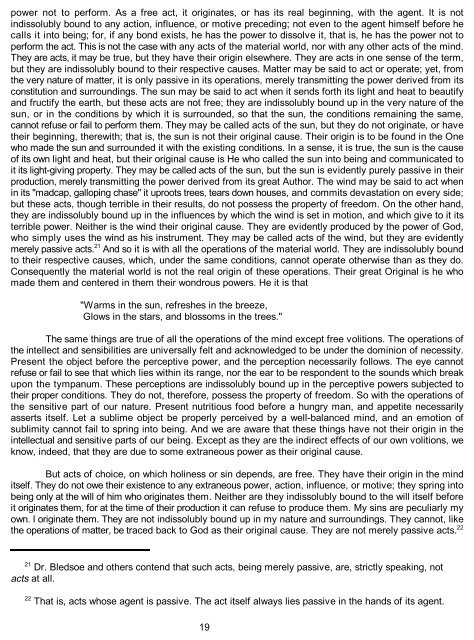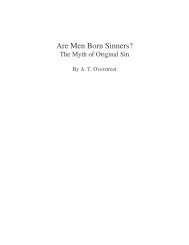Foreknowledge by Joel Hayes - Library of Theology
Foreknowledge by Joel Hayes - Library of Theology
Foreknowledge by Joel Hayes - Library of Theology
Create successful ePaper yourself
Turn your PDF publications into a flip-book with our unique Google optimized e-Paper software.
power not to perform. As a free act, it originates, or has its real beginning, with the agent. It is not<br />
indissolubly bound to any action, influence, or motive preceding; not even to the agent himself before he<br />
calls it into being; for, if any bond exists, he has the power to dissolve it, that is, he has the power not to<br />
perform the act. This is not the case with any acts <strong>of</strong> the material world, nor with any other acts <strong>of</strong> the mind.<br />
They are acts, it may be true, but they have their origin elsewhere. They are acts in one sense <strong>of</strong> the term,<br />
but they are indissolubly bound to their respective causes. Matter may be said to act or operate; yet, from<br />
the very nature <strong>of</strong> matter, it is only passive in its operations, merely transmitting the power derived from its<br />
constitution and surroundings. The sun may be said to act when it sends forth its light and heat to beautify<br />
and fructify the earth, but these acts are not free; they are indissolubly bound up in the very nature <strong>of</strong> the<br />
sun, or in the conditions <strong>by</strong> which it is surrounded, so that the sun, the conditions remaining the same,<br />
cannot refuse or fail to perform them. They may be called acts <strong>of</strong> the sun, but they do not originate, or have<br />
their beginning, therewith; that is, the sun is not their original cause. Their origin is to be found in the One<br />
who made the sun and surrounded it with the existing conditions. In a sense, it is true, the sun is the cause<br />
<strong>of</strong> its own light and heat, but their original cause is He who called the sun into being and communicated to<br />
it its light-giving property. They may be called acts <strong>of</strong> the sun, but the sun is evidently purely passive in their<br />
production, merely transmitting the power derived from its great Author. The wind may be said to act when<br />
in its "madcap, galloping chase" it uproots trees, tears down houses, and commits devastation on every side;<br />
but these acts, though terrible in their results, do not possess the property <strong>of</strong> freedom. On the other hand,<br />
they are indissolubly bound up in the influences <strong>by</strong> which the wind is set in motion, and which give to it its<br />
terrible power. Neither is the wind their original cause. They are evidently produced <strong>by</strong> the power <strong>of</strong> God,<br />
who simply uses the wind as his instrument. They may be called acts <strong>of</strong> the wind, but they are evidently<br />
21<br />
merely passive acts. And so it is with all the operations <strong>of</strong> the material world. They are indissolubly bound<br />
to their respective causes, which, under the same conditions, cannot operate otherwise than as they do.<br />
Consequently the material world is not the real origin <strong>of</strong> these operations. Their great Original is he who<br />
made them and centered in them their wondrous powers. He it is that<br />
21<br />
Dr. Bledsoe and others contend that such acts, being merely passive, are, strictly speaking, not<br />
acts at all.<br />
22<br />
"Warms in the sun, refreshes in the breeze,<br />
Glows in the stars, and blossoms in the trees."<br />
The same things are true <strong>of</strong> all the operations <strong>of</strong> the mind except free volitions. The operations <strong>of</strong><br />
the intellect and sensibilities are universally felt and acknowledged to be under the dominion <strong>of</strong> necessity.<br />
Present the object before the perceptive power, and the perception necessarily follows. The eye cannot<br />
refuse or fail to see that which lies within its range, nor the ear to be respondent to the sounds which break<br />
upon the tympanum. These perceptions are indissolubly bound up in the perceptive powers subjected to<br />
their proper conditions. They do not, therefore, possess the property <strong>of</strong> freedom. So with the operations <strong>of</strong><br />
the sensitive part <strong>of</strong> our nature. Present nutritious food before a hungry man, and appetite necessarily<br />
asserts itself. Let a sublime object be properly perceived <strong>by</strong> a well-balanced mind, and an emotion <strong>of</strong><br />
sublimity cannot fail to spring into being. And we are aware that these things have not their origin in the<br />
intellectual and sensitive parts <strong>of</strong> our being. Except as they are the indirect effects <strong>of</strong> our own volitions, we<br />
know, indeed, that they are due to some extraneous power as their original cause.<br />
But acts <strong>of</strong> choice, on which holiness or sin depends, are free. They have their origin in the mind<br />
itself. They do not owe their existence to any extraneous power, action, influence, or motive; they spring into<br />
being only at the will <strong>of</strong> him who originates them. Neither are they indissolubly bound to the will itself before<br />
it originates them, for at the time <strong>of</strong> their production it can refuse to produce them. My sins are peculiarly my<br />
own. I originate them. They are not indissolubly bound up in my nature and surroundings. They cannot, like<br />
the operations <strong>of</strong> matter, be traced back to God as their original cause. They are not merely passive acts. 22<br />
That is, acts whose agent is passive. The act itself always lies passive in the hands <strong>of</strong> its agent.<br />
19






